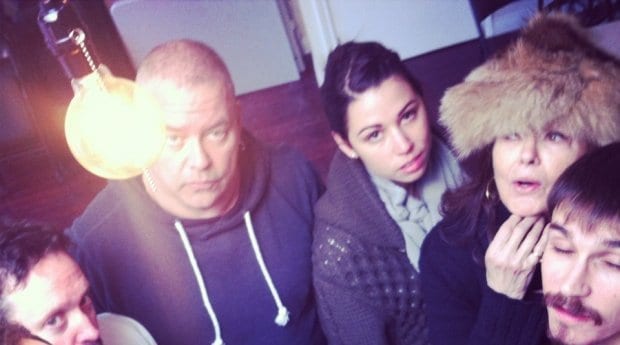Russian society used to be simple: it was merely the source of all villains for action films. Now it’s a mystery to most of us. What is Russia? Well, it’s a place that treats its queer people awfully. Why does it do that? How can ordinary people in Russia tolerate this type of persecution?
In the play Komunka, co-creator Yury Ruzhyev tries to give some context to the troubling news emanating from Russia. Set in a communal apartment — where people of different backgrounds live together, but in their own rooms, sharing a kitchen and bathroom — Komunka showcases an interesting cross-section of Russian society, from the corrupt businessman who approves of the status quo to the gay couple just trying to make sense of their relationship. The contrast between each person’s lifestyles, station or stage in life and view on Russian society results in some interesting conversations when they meet in the kitchen.
The play begins with a light bulb being screwed in. As the kitchen is illuminated, the apartment’s occupants storm in, raging about their own particular issues, creating an almost unbearable cacophony.
Some of what they say is offensive — there’s misogyny, ageism, homophobia, racism, anti-Semitism and plain ol’ snobbery — but this apartment is supposed to represent a diverse Russia, with a plethora of perspectives, and when I imagine many of those perspectives crammed into one apartment, it’s this loud and crude — probably louder and cruder!
The audience is seated in the usual audience place, but also onstage, and some people are even seated at the kitchen table with the actors. Some of the characters’ bedrooms are behind the audience, so when people storm off to their rooms, they’re storming out into the audience and beyond. I think if you’re going to make a play noisy and coarse, you might as well go whole hog — really make the audience feel like they’re in this confusing, messy apartment. If the goal is to help the audience understand how Russian people think and interact — which it is — then it’s best to make them feel like they’re among Russian people. Short of flying us all to a particularly dismal apartment in Russia, I think Ruzhyev does this perfectly.
I attended the initial workshop performance for Komunka, which took place in February at the same time as the closing ceremonies for the Winter Olympics in Sochi. As a result, I can see many of the improvements made to the play since that time, including the removal of some not-quite-believable projections, and the play is now more concise and coherent.
Unfortunately, when polishing up the performance, Ruzhyev seems to have tried a bit too hard to hammer home some of his points, making some of the jokes a bit hammy and one of the gay guys far more flaming than he probably should be. Part of the charm of the workshop performance was the subtlety of the dialogue and jokes, and it’s a shame to see some of that go.
However, on the whole, the play feels much improved and is thoroughly enjoyable. It’s burpy, yelly, smacky, stompy, tipsy, cutesy and unexpectedly charming — everything I’d expect from a microcosm of a country — and I left feeling satisfied, amused and enlightened.
Komunka runs until Sun, July 13, at Helen Gardiner Phelan Playhouse, 79 St George St. fringetoronto.com


 Why you can trust Xtra
Why you can trust Xtra


